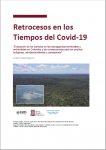21 Dec 2020
This manual, through a series of concepts and guidelines, seeks to contribute to the safe exercise of the right to indigenous justice, prioritising the resolution of conflicts through traditional and peaceful mechanisms, and without contemplating violence or other types of aggression that could be used against them, whether through criminalisation by the state justice system or other types of harassment.









